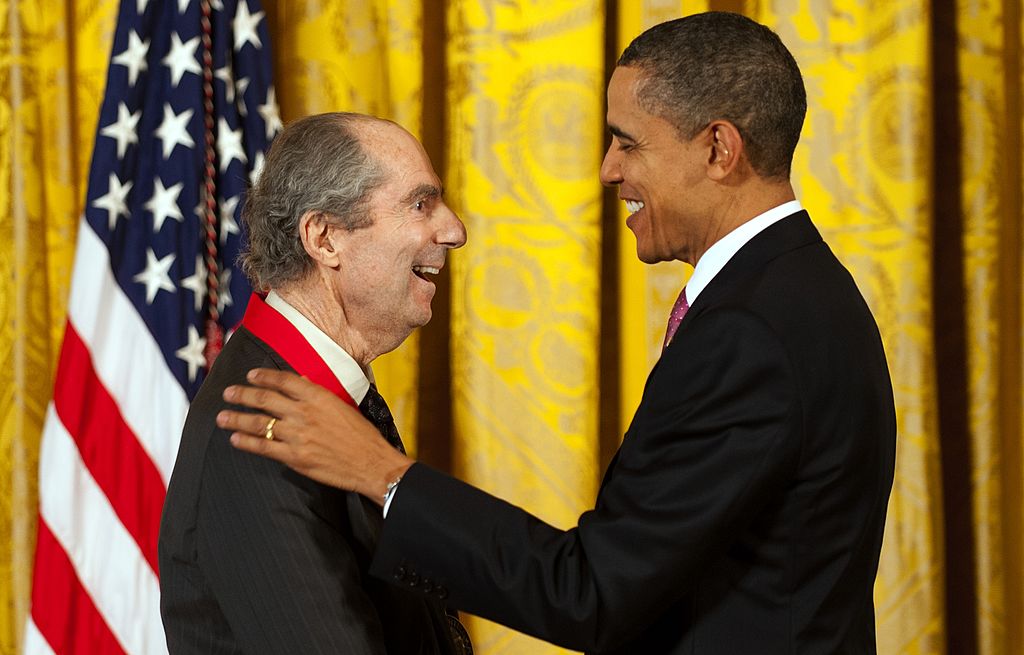Hard to avoid the suspicion the latest clamor for Philip Roth to be canceled isn’t just a marketing gimmick by the publishers of the great man’s latest biography. #MeToo repackaged as a means to shift product, in other words. For what could we possibly now have learned about the author, just three years after his death, that would cause a meaningful reappraisal of his position — with Saul Bellow and Don DeLillo — at the pinnacle of modern literature?
That he was very sexy? Is that it?
‘God, I’m fond of adultery,’ he is said to have said in Blake Bailey’s Philip Roth: The Biography, apparently while prowling London on the hunt for Chinese prostitutes. Pass the smelling salts. In fact, we’re told the very first time he visited the land of Shakespeare and Dickens, in 1958, he wasted little time in immersing himself in the local culture. On day one, as Blake relates, like a young Byron he took in the Rosetta Stone, the Elgin Marbles and a Soho prostitute. He’d have been 25 at the time — and yet to publish his first book.
The problem with canceling Roth, I suppose, is that if he was such a vile misogynist — which is the traditional charge against his work — why did so many women seem to find him so irresistible? It’s a question for the woke warriors, certainly. Looking at a list of his conquests, which includes Mia Farrow, it’s a wonder the man got anything else done. In Bailey’s book we learn that Roth lied to his second wife, the actress Claire Bloom, about being impotent — only to then have to dash from his bed in the mornings using his hands to conceal the old morning glory. At the time, apparently, he was having two affairs.
We’re also told that his legendary ability to seduce remained not only into middle age — ‘I was 40 and she was 19… perfect, as God meant it to be’ — but also into old age. He was 69, when he began a relationship with Lisa Halliday, then 25.
Is this stuff sufficiently bad behavior to have Roth expunged not only from the literary canon, but from all cultural life? Surely not. Or not yet, anyway.
Over the years, we have grown accustomed to attacks on Roth the man, as opposed to Roth the writer. In the days following his death in 2018, for example, headlines of the ‘literary giant, maybe, but what an awful man’ variety abounded — clickbait opportunities to rehash colorful tales of literary and amorous scandals from a bygone era. What seems different this time is the attempt at confluence — the effort to make artist and art inseparable, and then to go after both as one.
Author Sandra Newman — me neither — is quoted in the Times of London as saying: ‘I think he was saying things he believed.’ What a charge to make against any writer! But surely we deserve deeper exploration of the accusation. Does she mean everything Roth wrote — the novels sold as fiction that earned the writer some of fiction’s greatest prizes — were in actual fact not fiction, but, instead terrifying manifestos from a deranged mind?
You think of the scenes in Sabbath’s Theater in which the eponymous hero Mickey Sabbath, a puppeteer, of all things, takes to masturbating in the dead of night on the grave of his dead lover, Drenka. If Newman is right, then finally — and mercifully — the innocent reader is spared the immense effort of wondering what sort of twisted imagination could conceive of such a thing. Much simpler to take as read that the moron author believed you could commune meaningfully with the dead in this way.
Before he died, Roth seemed to have arrived at the opinion that the reading public had become idiotified. In 2000, he told journalist David Remnick: ‘I think the whole effort of the first half of the 20th century, the whole intellectual and artistic effort, was to see behind things, and this is no longer of interest.’
He added: ‘The writer is now just not of interest to the public as somebody who may have an inroad into the consciousness. The writer is only interesting in terms of how much money did he get and what’s the scandal. That’s all they’re interested in. Because the other stuff is useless, they don’t want it.’
Roth wrote 31 books, all of which, to a greater or lesser extent, were deliberately provocative. Clearly, he relished saying the unsayable in print, and jabbing his thumb deep into cultural sensitivities at every opportunity. Viewed in this way, his career as a writer can be seen as a brilliant high-wire act of intellectual virtuosity — daring slower minds than his to give in to outrage and to attempt unsuccessfully to pull him down to Earth. No part of him feared appalling polite society, and it’s hard to think he wouldn’t enjoy his notoriety from beyond the grave today.
That said, controversy sells, and publishers know it. There’s another Roth biography out this month — Ira Nadel’s Philip Roth: A Counterlife, due next week — so expect more salacious tales of sexual impropriety and half-baked calls for #MeToo cancellation.
As the writer himself well knew — there’s money in scandal.


















